The Intel Core i9-9900K at 95W: Fixing The Power for SFF
by Ian Cutress on November 29, 2018 8:00 AM ESTCPU Performance: Office Tests
The Office test suite is designed to focus around more industry standard tests that focus on office workflows, system meetings, some synthetics, but we also bundle compiler performance in with this section. For users that have to evaluate hardware in general, these are usually the benchmarks that most consider.
All of our benchmark results can also be found in our benchmark engine, Bench.
PCMark 10: Industry Standard System Profiler
Futuremark, now known as UL, has developed benchmarks that have become industry standards for around two decades. The latest complete system test suite is PCMark 10, upgrading over PCMark 8 with updated tests and more OpenCL invested into use cases such as video streaming.
PCMark splits its scores into about 14 different areas, including application startup, web, spreadsheets, photo editing, rendering, video conferencing, and physics. We post all of these numbers in our benchmark database, Bench, however the key metric for the review is the overall score.
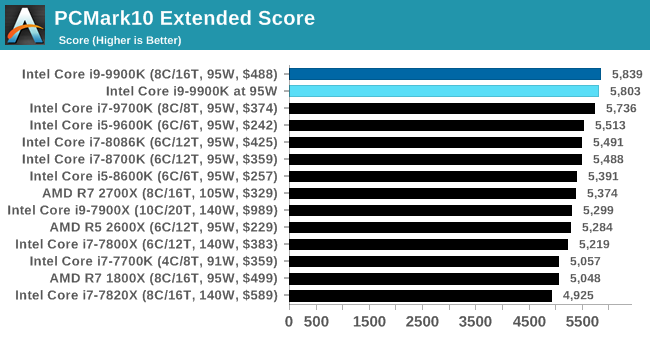
PCMark10 is more forgiving, as it has lots of pauses and only a few full-on power tests, emphasising single core speed. There isn't much lost when in 95W mode here.
Chromium Compile: Windows VC++ Compile of Chrome 56
A large number of AnandTech readers are software engineers, looking at how the hardware they use performs. While compiling a Linux kernel is ‘standard’ for the reviewers who often compile, our test is a little more varied – we are using the windows instructions to compile Chrome, specifically a Chrome 56 build from March 2017, as that was when we built the test. Google quite handily gives instructions on how to compile with Windows, along with a 400k file download for the repo.
In our test, using Google’s instructions, we use the MSVC compiler and ninja developer tools to manage the compile. As you may expect, the benchmark is variably threaded, with a mix of DRAM requirements that benefit from faster caches. Data procured in our test is the time taken for the compile, which we convert into compiles per day.
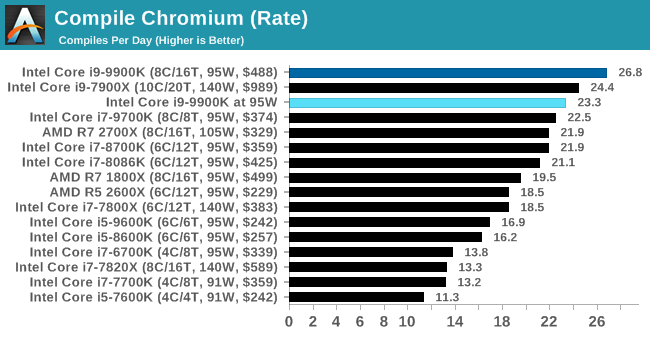
The 95W mode causes a small decrease in performance in our compile test, again moving it within a small margin to the Core i7-9700K.
3DMark Physics: In-Game Physics Compute
Alongside PCMark is 3DMark, Futuremark’s (UL’s) gaming test suite. Each gaming tests consists of one or two GPU heavy scenes, along with a physics test that is indicative of when the test was written and the platform it is aimed at. The main overriding tests, in order of complexity, are Ice Storm, Cloud Gate, Sky Diver, Fire Strike, and Time Spy.
Some of the subtests offer variants, such as Ice Storm Unlimited, which is aimed at mobile platforms with an off-screen rendering, or Fire Strike Ultra which is aimed at high-end 4K systems with lots of the added features turned on. Time Spy also currently has an AVX-512 mode (which we may be using in the future).
For our tests, we report in Bench the results from every physics test, but for the sake of the review we keep it to the most demanding of each scene: Cloud Gate, Sky Diver, Fire Strike Ultra, and Time Spy.
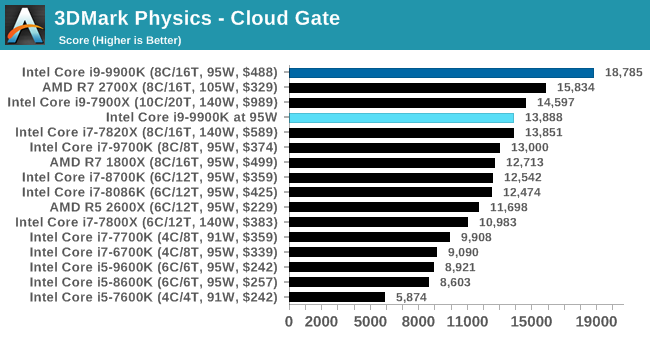
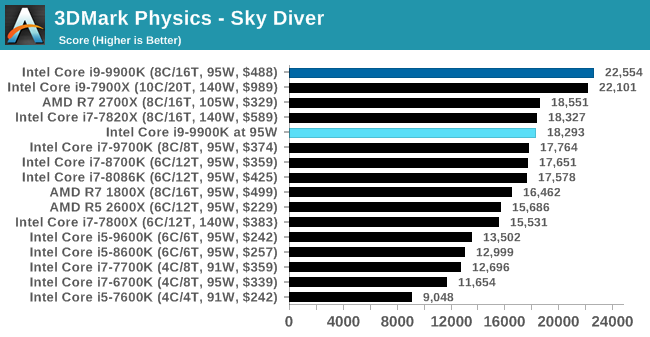
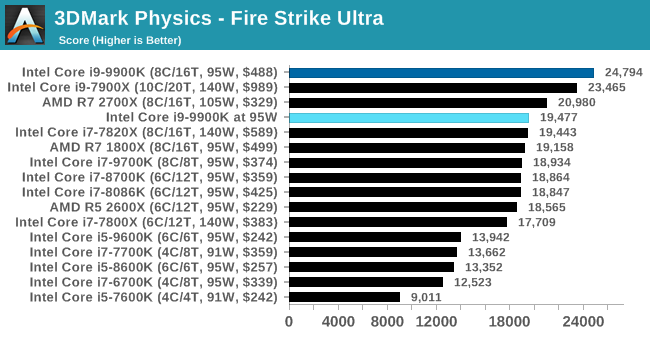
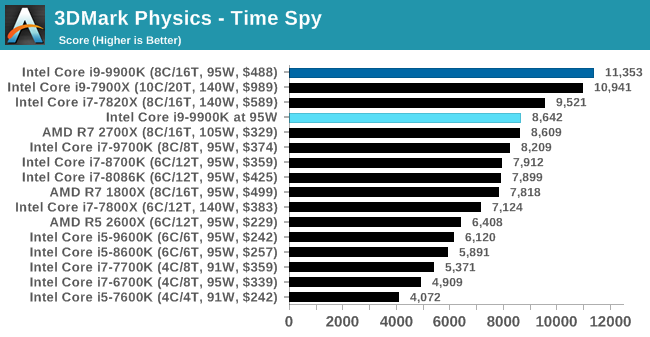
GeekBench4: Synthetics
A common tool for cross-platform testing between mobile, PC, and Mac, GeekBench 4 is an ultimate exercise in synthetic testing across a range of algorithms looking for peak throughput. Tests include encryption, compression, fast Fourier transform, memory operations, n-body physics, matrix operations, histogram manipulation, and HTML parsing.
I’m including this test due to popular demand, although the results do come across as overly synthetic, and a lot of users often put a lot of weight behind the test due to the fact that it is compiled across different platforms (although with different compilers).
We record the main subtest scores (Crypto, Integer, Floating Point, Memory) in our benchmark database, but for the review we post the overall single and multi-threaded results.
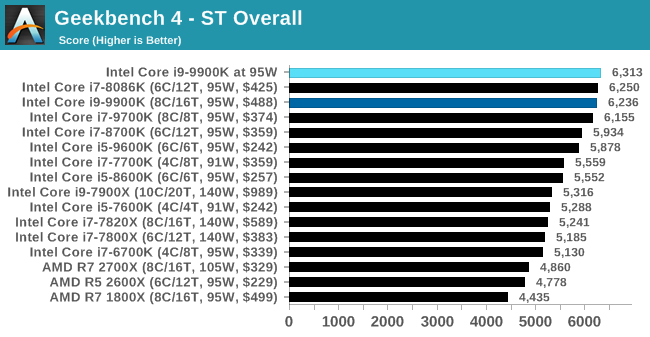
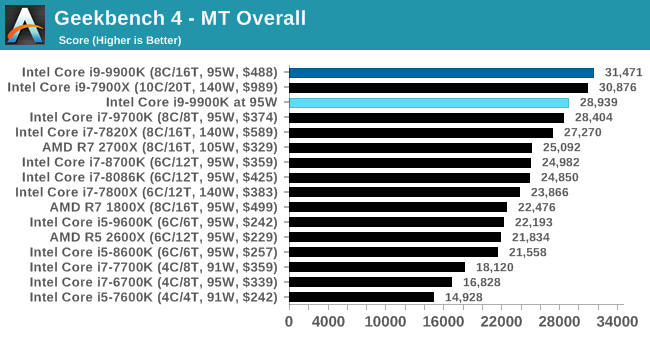










101 Comments
View All Comments
Rukur - Monday, December 3, 2018 - link
9900K comes out of the box with 5Ghz so its going to win on games. The prize it a game stopper but.woggs - Thursday, November 29, 2018 - link
"This rises to 44.2 if the processor is fixed to 95W" but there is no data point on the plot at that spot. A mouse-over labeling of that plot would be very-helpful.romrunning - Thursday, November 29, 2018 - link
I don't understand - the article title says "Fixing the Power for SFF", and yet no motherboards with the form factor typically used in SFF systems were actually tested. The motherboards listed were all ATX; no mini-ITX or even micro-STX boards were used.Why not? Wouldn't this have provided valuable insight for those looking to purchase a SFF system, custom or DIY, to see which mfgs cap the TDP usage or let it go full range?
The author said he tested a MSI Vortex G3 small form factor desktop last year. Well, why not get some comments from ASRock, Gigabyte, ASUS, and MSI as to whether it's standard practice for them to limit CPUs to a specific power limit in their BIOS for those SFF boards.
Fro example, I'd love to know if that sweet-looking ASRock DeskMini GTX Z390 that was recently reviewed can take the i9-9900k rated at 95W to the full "unlimited" power settings. I can put 450-600W SFX/SFX-L PSUs into a SFF system, so I'd like to know if I can get the full performance out of the CPU or if the mfg locks the power draw in the BIOS.
SaturnusDK - Thursday, November 29, 2018 - link
Why is this article, and Anandtech in general, using 1000 unit OEM prices for Intel products which are typically 15-20% less than the lowest retail price you can find. But use the highest you can find retail prices for AMD products? It seems like Anandtech is deliberate trying to make people think Intel products have any value when the reality is that they don't.Rezurecta - Thursday, November 29, 2018 - link
Good re-review. Although, Ian doesn't seem to want to call Intel out. This is OBVIOUSLY something initiated by Intel. If the 9900k were to run in spec it would be slower than the 2700x in a LOT of benchmarks. Intel couldn't have that for such a massive hot monolithic die. That's why all the shady sponsored benchmarks and having the processor way out of spec.It's obvious Intel is hurting. Let's hope this brings about a competitive landscape again.
kernel-panic - Thursday, November 29, 2018 - link
it would be nice if somewhere you let readers know what TDP, PL1 and PL2 mean. I enjoy this kind of articles but I'm not related with the terminology.Icehawk - Thursday, November 29, 2018 - link
It's in the (by now) linked article at the very beginningMr Perfect - Thursday, November 29, 2018 - link
How do motherboards treat the non-k versions of these CPUs? When I built my mITX machine, I bought the non-K processor since there wouldn't be any overclocking going on. Just how locked is a locked CPU? Technically, this could be considered turboing ratehr then overclocking and could be applied to the non-Ks.Targon - Sunday, December 2, 2018 - link
It is possible that Intel won't release a non-k version of these chips, just because there won't be a significant enough performance benefit vs. the AMD 2700X if the chips were not being pushed to their absolute limit.stux - Thursday, November 29, 2018 - link
An interesting point that you make is that a 9900K constrained to 95W performs like an unconstrained 9900K for single threaded loads and an unconstrained 9700K for multithreaded loads.The 9700K has half the threads, so that is an interesting claim, and I think the key is how does the 9700K perform when constrained to 95W.
Hyperthreading is supposed to be a big win to perf/W, thus I’d expect 9900K at 95W to be more efficient than the 9700K for the same perf, which is a definitive win too.
How does the 9700K at 95W perform in the multi threaded benchmarks?